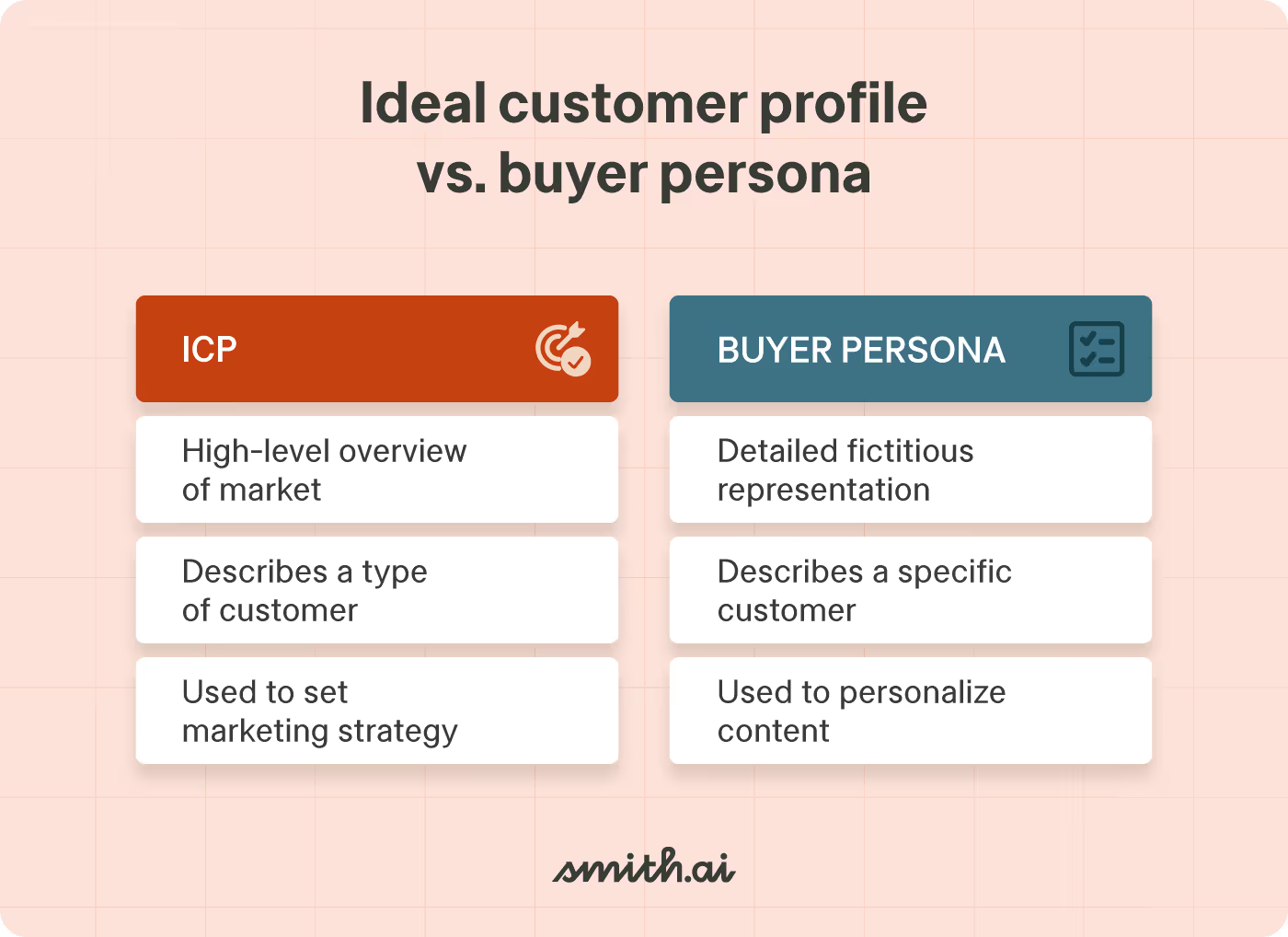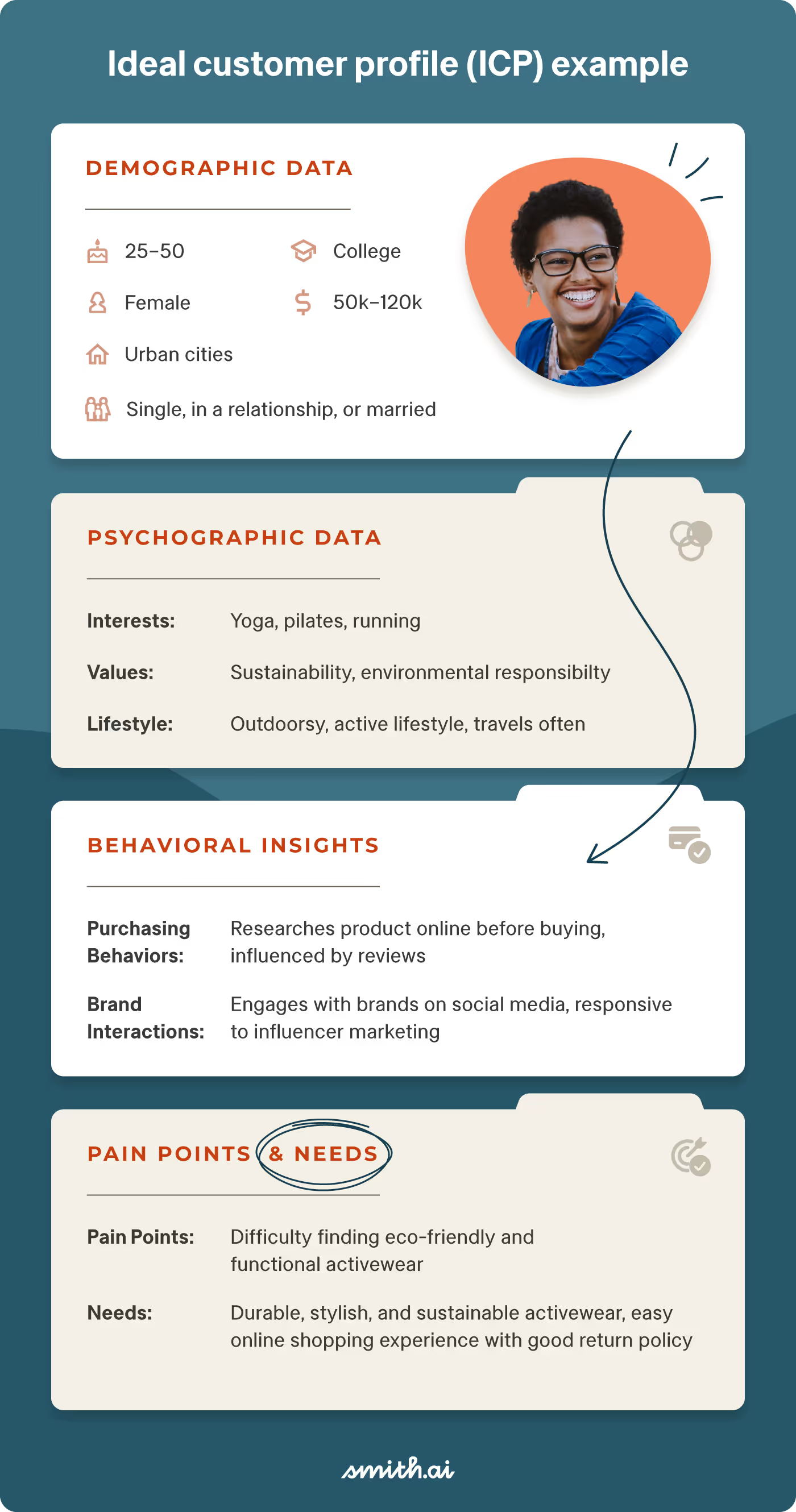Mastering ICP Sales: The Blueprint for Unparalleled Business Success
Mastering ICP Sales: The Blueprint for Unparalleled Business Success

For most salespeople and business owners, a temptation exists to view every handshake or casual chat as a potential lead. While interactions are abundant, not all are golden opportunities for sales. Discerning businesspeople understand the importance of an ICP sales strategy.
By constructing a precise ICP, or ideal customer profile, businesses can channel their energy, sales, and marketing efforts toward customers who are most likely to buy and who believe in the offering. Instead of shouting into a void, it’s about whispering into the ears of those who genuinely want to listen.
If you need help finding ideal sales leads for your business, keep reading. We’ll review the significance of developing an ideal customer profile and five easy steps to create your own and improve your sales performance.
What is an ICP in sales?
An ideal customer profile (ICP) is a detailed representation of your business’s perfect customer, highlighting their buying behavior, pain points, and characteristics. It focuses on what your customers like, what makes them tick, and how your product or service can meet their needs. By establishing a clear ICP, companies can direct their time and financial resources with laser precision.
Why is this crucial? Generic sales pitches are becoming obsolete in today's saturated market. Businesses can no longer afford to spread their nets wide and hope for the best. With an ICP, you’re not just hoping — you're strategizing.
Understanding your ideal customer ensures marketing campaigns deeply resonate and your offer aligns with buyers’ needs. A recent study showed that businesses that leverage a well-defined ICP enjoy a 68% higher account win rate.
ICP sales examples
The ICP sales methodology defines the quintessential traits of your most valuable customers, providing clarity and focus for your sales endeavors. To paint a clearer picture, here are five customer profile examples of businesses and their ICPs:
B2B software firm: medium-sized tech companies with over 100 employees and recently received Series A funding
Organic baby food brand: health-conscious parents ages 28-40 living in urban areas with an average household income above $85,000
Luxury watch retailer: professionals ages 40-60 with a disposable income of over $150,000 and a penchant for classic fashion
Pet spa service: millennial pet owners residing in upscale neighborhoods who frequently pamper their pets with luxury services
Artisanal coffee subscription: coffee lovers ages 25-45 who appreciate gourmet experiences and often discuss coffee on social media platforms
ICP vs. buyer persona
Although ideal customer profiles and buyer personas both deepen the level of audience insight and customer understanding, they differ in scope and purpose. They might seem interchangeable at first glance, but the difference is in how organizations use the research and findings.
An ICP is a framework that describes your perfect customer. Imagine it as a blueprint pinpointing individuals (B2C) or organizations (B2B) that completely align with your brand offering.
Conversely, a buyer persona is a fictitious representation based on the actual information of a company’s customers. It isn’t just about who might buy your product but why they would invest, what triggers their decisions, and which touchpoints resonate most. The buyer persona personalizes approaches, services, channels, and content at different stages of their journey.
So while an ICP sales document provides a bird’s-eye view of an ideal customer's overarching characteristics — the buyer persona zooms in, offering a more granular understanding. Together, they form a formidable duo, ensuring marketing strategies are not only targeted, but deeply resonant, helping ensure much more efficient use of time and resources while producing better outcomes.

Benefits of adopting an ICP sales approach
By implementing an ICP sales strategy, you can unlock a number of advantages that can completely transform your company. Let’s dive into a few.
Enhance customer engagement
Connect with your ideal customers by crafting marketing and sales communications that speak directly to their needs and desires. Customer engagement naturally increases when they feel understood by a company. Beyond simple interactions, this improved engagement fosters a sense of loyalty, which results in lasting relationships and customer referrals.
Improve conversion rates
Unlike a generic approach, an ICP enables you to customize your pitches to address pain points that resonate with your audience. The likelihood of a sale dramatically rises when your goods or services address the problems your audience has been trying to solve. Every interaction becomes a chance to highlight your brand’s value, creating an efficient sales funnel.
Increase customer retention
Customer satisfaction soars when you’ve carefully identified your ideal buyer and shaped your marketing efforts to suit their needs. Customers who are happy with a service are more likely to stay with a company, which lowers the churn rate and increases the average lifetime value of each customer. Research shows increasing customer retention rates by only 5% increases profits by up to 95%.
Optimize marketing strategies
ICP sales allow you to strategically target those who are most likely interested in your offerings rather than casting a wide net and hoping for bites. This focused strategy minimizes resource waste on audiences who aren’t likely to convert while maximizing the impact of your marketing initiatives.
Leverage lead lists
With lead lists tailored to your ICP, you can swiftly identify and connect with potential customers, removing the guesswork from your marketing campaigns. It’s a direct route to those individuals or businesses that perfectly match your ideal customer profile, allowing your sales team to focus their energy on high-potential leads.
Components of a successful ICP
Before crafting a winning sales strategy, you should grasp the key components that elevate an ICP from good to great. These elements ensure your marketing strategies resonate with your ideal customers. Here’s what you need to know:
- Demographic data: Crucial elements like age, gender, and location give you a thorough understanding of your target audience. This data is the foundation for creating a deeper profile and exploring what motivates your ideal clients.
- Psychographic data: To know your customer, you must understand their psychographics, or their attitudes, aspirations, and other psychological traits. You can build a solid and meaningful connection by knowing what personally and emotionally resonates with and motivates customers.
- Firmographic data: Just as psychographics provide insight into individual consumer behaviors, firmographics offer a similar lens, but for businesses. These characteristics, including industry, company size, location, technology, funding, and revenue, help define and narrow down which companies best fit a specific B2B product or service.
- Behavioral insights: By examining spending patterns, engagement levels, and brand interactions, you can anticipate buyer needs, adjust your offerings, and improve the customer experience. Knowing where and how buyers interact with your brand will help you strategically position your goods or services in the marketplace

Crafting the perfect ICP sales strategy in 5 steps
These five steps will guide you in honing an ICP sales strategy that’s both targeted and adaptable, ensuring you’re always on the same page as your ideal customer.
1. Define your current best customers
The first step in crafting a successful ICP is identifying your best customers. Who does your product or service appeal to most and who are the most profitable targets? Pinpointing common traits and characteristics among these customers is the initial phase of preparing a comprehensive ICP that resonates with your most valuable audience.
2. Gather data
Gain a 360-degree view of your customers by gathering and reviewing demographic, psychographic, and firmographic data. Survey existing customers, gather feedback from your frontline teams like customer service or sales, and get an in-depth look into customer behavior. Use tools such as Hotjar, HubSpot, and Google Analytics. This ensures your ICP is well-informed, accurate, and reflective of your audience's nuanced actions and identities.
3. Analyze and identify
With a treasure trove of customer data at your disposal, it’s time to uncover the hidden patterns and similarities. Questions to ask during this analysis can include:
- Who are our most profitable customers?
- What common characteristics do our top customers share?
- Which products or services are most popular among top customers?
- What type of objections do they typically have during the buying process?
- What challenges or pain points do our ideal customers frequently express?
Businesses can gain invaluable insights into their ideal customer by addressing these questions. Such insights allow companies to anticipate customer needs and meet them head-on.
4. Understand the buying journey
Based on your analysis of trends, map out your top customers’ journeys — from initial awareness to final purchase. Understanding each touchpoint and decision-making stage gives you invaluable insights into their needs at every step. This understanding allows you to fine-tune your sales strategies, ensuring they align seamlessly with the natural flow of the purchasing process.
5. Review and update
The business world is ever-evolving, as are market trends and customer preferences. Regularly reviewing and updating your ICP is essential to its longevity and relevance. Maintaining the flexibility to adjust your ICP ensures your strategies remain on point and always align with customer demands.
Challenges in ICP sales
Though powerful, ICP sales isn't without hurdles. Tapping into the potential of this framework requires an in-depth understanding of not just its benefits but also its challenges. Here are three of the most prevalent obstacles when setting up your ICP:
- Data accuracy: An ICP relies heavily on quality data. Whether it’s firmographics in B2B or demographics in B2C, data accuracy directly impacts an ICP’s effectiveness. Factors like industry shifts, mergers, or internal company changes can quickly make once-relevant data obsolete.
- Over- or under-specification: Crafting the perfect ICP is more art than science. Balancing between being overly specific and too broad can be tricky. Too narrow, and you might overlook potential good-fit customers. Too wide, and you dilute the effectiveness of targeted sales strategies. Achieving that sweet spot of precision requires continuous refinement and a deep understanding of market dynamics.
- Stakeholder resistance to change: Transitioning to an ICP-centric approach often requires a shift in sales and marketing strategies. This change can meet resistance if the whole team isn’t on board — leading to a disjointed implementation of the ICP strategy. Such a situation stresses the importance of top-down buy-in, proper training, and clear communication about the benefits of an ICP throughout your entire organization.
With awareness and proactive strategies, businesses can navigate these hurdles and fully harness the power of ICP sales.
Smith.ai can help you succeed with ICP sales
A well-defined ICP sales strategy proves that success in sales is not about casting the widest net, but about reaching out strategically. By deeply understanding your ideal customer, you position yourself to engage with those who genuinely benefit from your brand’s products or services.
After developing an ICP sales strategy, let Smith.ai’s live agents help with your sales outreach campaigns. Book a consultation today to learn how we can implement your ICP sales strategy.
Take the faster path to growth. Get Smith.ai today.
Key Areas to Explore

Your submission has been received!













.svg)



